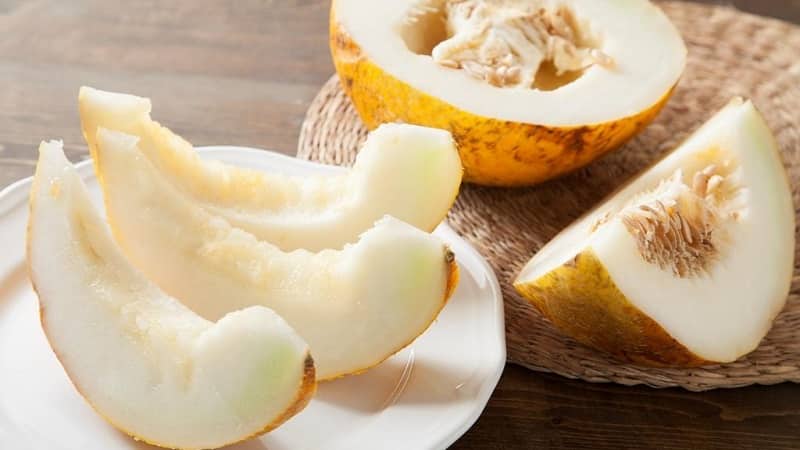The benefits and harms of melon for the body
From helminths and anemia, for stress and hormonal surges, for immunity and beauty of hair - this is a short list of the beneficial properties of ordinary melon.
In the article we will talk about the benefits and harms of melon for the body, how and under what conditions diseases It is recommended to take it, we will share healing recipes from its seeds. You will find out whether the product can be eaten during pregnancy and breastfeeding, and at what age it is recommended to give it to children.
Chemical composition of melon

Melon is valued for its unique taste, healing qualities and composition. The main components of any product are proteins, fats and carbohydrates (BJU). In 100 g of melon, the composition of BZHU is as follows:
- water – 88.5 g;
- proteins – 0.6 g;
- fats – 0.3 g;
- carbohydrates – 7.4 g.
Melon is ahead of tomatoes and pineapples in terms of the content of vitamins B and C. It is rich in micro- and macroelements such as calcium, magnesium, sodium, potassium, phosphorus, iodine. The pulp of the fruit contains up to 20% sugar, the seeds contain glutelin, globulin, resins and glucose, as well as oil, which is eaten.
There is more folic acid and iron in melon than in cow's milk. This component has a positive effect on the immune system and helps fight diseases. Replaceable and essential amino acids, complex and simple carbohydrates give the culture special value.
Beneficial features
Possessing an extensive range of useful substances, melon rightfully occupies one of the first places in the summer diet. Let's consider the impact on human health:
- Thanks to folic acid, just a few slices of the product a day will improve your blood composition and help cope with anemia.
- Constant consumption of melon will have a positive effect on the cardiovascular system.
- Amino acids affect the nervous system, calming and relieving tension, especially during depression.
- Due to its low calorie content, the product is suitable for dietary nutrition.
- Regular consumption of melon will protect against atherosclerosis and other vascular problems.
- The product removes harmful cholesterol from the body.
- Due to its fiber content, melon juice is used in the treatment of constipation and hemorrhoids.
- Doctors recommend eating melon for rheumatism and tuberculosis to strengthen the immune system.
- Vitamin C helps fight viruses, iron increases hemoglobin levels.
- Expectorant anti-inflammatory decoctions are prepared from it.
- Used as an anthelmintic.
- Seeds boiled in milk or water are used for kidney and bladder diseases. Melon has diuretic action, improving kidney function.
- The pulp is used for cosmetic purposes. It is crushed and used alone or mixed with other ingredients. Ointments prepared from the pulp have a rejuvenating effect and increase skin elasticity.
- The juice strengthens the hair.
For women

Melon is good for women of any age. Silicon, which is part of melon, nourishes the skin, improves metabolism, strengthens nails and hair. It is especially recommended for older ladies. A few slices a day will improve intestinal motility and help the immune system. Folic acid will support hormonal levels during menopause and ease the general condition of a woman during her critical days.
For men
The stronger half of society can safely include melon in their daily diet. It is known that it has a positive effect on male potency, enhancing sperm production. 2 g of seeds per day, diluted with honey, will help the functioning of the male reproductive system.
Attention. You should not exceed the daily seed intake (2 g) so as not to overload the spleen.
Why melon is useful for men, as well as for all people:
- saturates with vitamins and minerals;
- removes toxins from the body;
- increases efficiency and mental activity;
- potassium improves heart condition, dilates blood vessels, removes cholesterol from the blood;
- Constant use of the product will improve the functioning of the gastrointestinal tract.
Dietary fiber found in the pulp has a cleansing effect on the intestines. Culture is especially useful for men who lead a sedentary lifestyle.
For children

Sweet melon useful for a growing child’s body:
- Vitamin C strengthens the immune system.
- Vitamin A improves vision.
- Carbohydrates help a child's growth and development.
- Constant use of the product calms the nervous system and has a relaxing effect.
- Melon and its seeds will help get rid of helminths, which often occur in childhood.
Important. You should not buy early melons so as not to be poisoned by nitrates. Start during the peak summer season. Choose ripe, undamaged fruits.
When including melon in a children's menu, remember that it can cause an allergic reaction. In addition, melon contains a lot of dietary fiber, which makes it difficult for children's stomachs.
Melon is introduced into a child’s diet gradually, starting from the age of two. The product is added in small portions of 100 g. It is not recommended to be given to children under two years of age.Having a laxative property, it negatively affects babies, causing intestinal upset.
For the elderly
Filled with vitamins and beneficial microelements, melon is a valuable product for older people. Elderly people are advised to use it carefully, adhering to the following rules:
- Do not combine with dairy or alcohol products.
- Do not drink with water.
- Consume only ripe fruits - in the second half of summer, when the likelihood of nitrates is minimal.
- Eat as a separate dish between breakfast, lunch or dinner.
Important. Improper use of the product can cause bloating, intestinal upset, heaviness in the stomach, and allergies.
Is it possible to eat melon during pregnancy and breastfeeding?
Ripe melon will be a source of vitamins and elements necessary for a woman during pregnancy and breastfeeding. It replenishes the need for active substances during fetal formation. Two or three slices of melon a day will fill the body of a woman and baby with vitamins: C, E, B, A, B9.
Having a laxative effect, it improves intestinal motility, which prevents constipation, especially in the second half of pregnancy. The product has a calming effect, helping to cope with postpartum depression.
However, women in an “interesting position” are not recommended to include it in their diet. The culture can cause allergies in a child.
Important. Nursing mothers should not get involved in culture for the first three months. Babies may develop diarrhea or allergies. The product is introduced into the diet gradually and carefully.
Melon for weight loss

Although it is sweet, it is a low-calorie product. The calorie content of melon is only 33 kcal per 100 g. By including it in your menu, you can get rid of extra pounds.An effective way is to make a melon breakfast. Consume it on an empty stomach, without combining it with other products.
Attention. When using melon for weight loss, do not forget that it increases appetite. It is also useful to know that the dried product has ten times more calories.
Health benefits of melon: healing recipes for various diseases
Melon is valued for its taste and healing qualities. People use it to treat abscesses by applying it to wounds. Doctors recommend including it in your diet for heart disease, stomach disease, colds, and nervous disorders. A decoction of pulp and seeds is used for cosmetic purposes to remove freckles. It is used to prepare rejuvenating face masks and strengthen hair.
Melon juice is used in the fight against worms. To solve the problem, it is advised to drink a glass of juice on an empty stomach.

We present several healing recipes for various diseases:
- People suffering from sugar diabetes, use melon seed flour to lower blood sugar levels. Grind the seeds in a blender to a powder. Pour a tablespoon of flour into a glass of boiling water. The solution is taken warm three times a day before meals. You can use another method. Dissolve 1 tsp in a glass of water. honey and flour. Drink five times a day for two weeks.
- During colds, the following composition is prepared to cleanse the lungs of phlegm and mucus: raw seeds along with the core are ground in a blender until a homogeneous mass is formed. The result is a mixture similar to milk. Cinnamon and anise are added to the mixture in the following proportion: 100 g of mixture - 1 pinch of seasonings. Take 50 g every three hours.
- Representatives of the stronger half of society use a decoction of the seeds to increase potency and for problems with the prostate gland.To do this, boil a tablespoon of dry seeds for 5 minutes in a glass. milk. Drink 50 g during the day in between meals.
Contraindications and harm
Unfortunately, not everyone can enjoy the taste of melon. There are a number of diseases for which it is contraindicated. These are diseases such as:
- diabetes mellitus (you can’t eat pulp);
- gastritis, pancreatitis in the acute stage;
- peptic ulcer of the stomach and duodenum;
- disease of the genitourinary organs in the acute stage;
- stones in the kidneys;
- inflammation of the rectum;
- allergy to the product;
- intestinal disorders, dysentery.
Excessive consumption of the product can lead to intestinal diseases and provoke heart disease.
Attention. The product cannot be combined with other foods. The best time to consume is two hours after a meal.
Conclusion
Melon is a valuable product, rich in vitamins, amino acids and minerals. Women of all ages can safely include it in their diet without fear of gaining weight. As a low-calorie product, it will help those who are losing weight and counting their daily norm of KBZHU. Pregnant women, children and the elderly consuming melon will benefit their immune system and intestines. But remember that you consume the product between meals. Recipes from seeds are used for colds, diabetes, and impaired male potency.